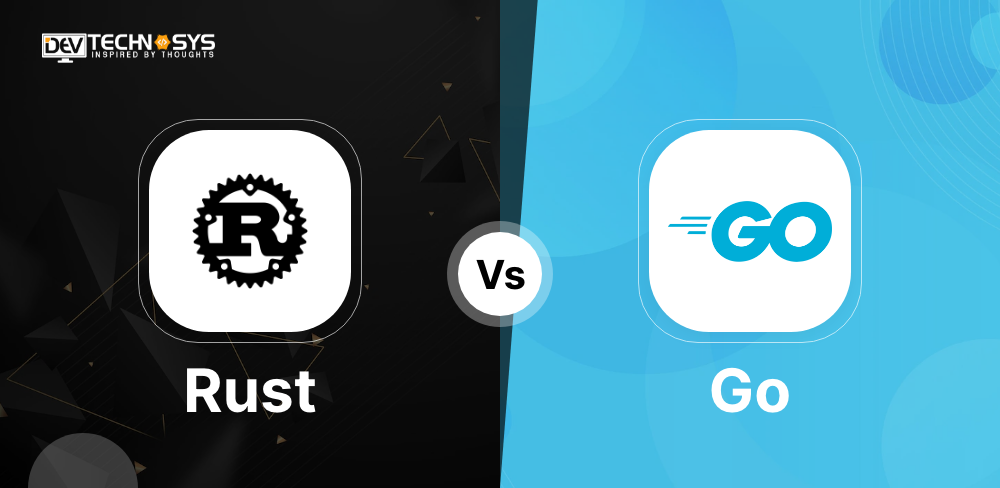Choosing an ideal programming language is the key to developing successful mobile applications and websites. Agree or not? Companies and developers must offer their clients the best expertise they’ve been looking for.
But, as ample programming languages are available in the market, it has become difficult for mobile app developers and web developers to choose one language. They keep up with new algorithms and can easily cope with the always-evolving processes.
Go, and Rust are gaining immense popularity among all the programming languages available. Go is a Google-based multi-paradigm programming language, while Rust is another multi-paradigm system programming language, which is why businesses often get confused. It is why the debate for Rust vs Go keeps roaming in their mind.
If you are also wondering the same, this article is for you. It will let you know everything about Go Vs Rust.
What is Rust?

Rust is a multi-paradigm high-level programming language developed by Mozilla and used by most programmers. It is designed to be fast, efficient, and safe. Rust is often used for building systems-level software, such as operating systems and web browsers.
One of the key features of Rust programming language is its emphasis on memory safety. The Rust compiler checks code at compile time to ensure that it does not contain any memory safety errors.
Known for its support for concurrent programming, Rust allows multiple processes to run simultaneously without interfering with each other.
What is Golang?

Golang, also known as Go, is a programming language developed by Google. This programming language is easy to read and write. It has efficient memory allocation and can be used for many applications. Go is often used for building network servers, distributed systems, and command-line tools.
Go is a statically-typed language; hence, its variables have a predetermined type that cannot be changed at runtime. It is also known for its concurrency support, making it easy to write programs that can run multiple processes simultaneously.
Rust Vs Go: Key Differences
Planning to develop a mobile app or a business website? Confused iaGo vs Rust programming language? Don’t be! The following key differences will let you know about go vs rust performance and help you make the best decision.
| Language | Go | Rust |
| Launched Year | 2009 | 2010 |
| Developed By | Mozilla | |
| Key Workloads | Web applications, APIs, networking, DevOps, CLI apps, Cloud apps, data processing | IoT, Cloud apps, security-sensitive apps, processing engines, system components |
| Software written in language | Docker, Kubernetes, Ethereum, Hugo, Caddy, Github CLI, Drone, Terraform, Syncthing | Ripgrep, Firefox, Habitat, Deno, alacrity |
One of the main differences between Rust and Go is the way they handle memory safety. Rust strongly emphasizes memory safety and uses a borrow checker to prevent memory safety errors. On the other hand, Go uses a garbage collector to manage memory, which can sometimes result in slower performance.
Another key difference between the two languages is their syntax. Rust has a more complex syntax and requires more code to accomplish the same tasks as Go. Go has a more concise syntax that is easier to read and write, making it a good choice for beginners.
Rust and Go are powerful languages with unique features and strengths. Still, some factors make the differences between rust vs go.
Detailed Differences Between Go Vs Rust Programming
Let’s take a detailed overview of Rust vs Go programming language, strongly signifying the major differences between Rust and Go programming.
1. Performance
Rust and Go are both known for their performance and efficiency. Rust is generally considered to be faster than Go, but the difference in Rust vs Go performance varies depending on the specific task you are trying to accomplish.
Rust support zero-cost abstractions, which is why Rust is often considered faster than Go. Rust allows you to write code that has direct control over memory and other resources, making it run faster than code written in higher-level languages like Go.
2. Development Speed
The development speed of Rust and Go varies depending on the specific project and the programmer’s experience. Go may be faster to work with than Rust because of its syntax.
Go has a straightforward syntax that is easy to read and write. It can make it hassle-free for beginners to learn and faster to write code in Go.
Another reason Go may be faster to work with is its support for concurrency. Go has built-in support for concurrent programming, which makes it easy to write code that can run multiple processes simultaneously. It enables faster development in Go than in languages like Rust, which do not have built-in support for concurrency.
3. Memory Safety
Both the programming languages, i.e., Rust and Go, are programming languages designed for safety and efficiency. Whenever it comes to memory safety, both have different approaches.
Rust strongly emphasizes memory safety and uses a specialized checker to prevent memory safety errors. The Rust compiler checks code at compile time to ensure that it does not contain any memory safety errors, such as null.
On the other hand, Go uses a garbage collector to manage memory. It means that Go automatically reclaims the memory that is no longer being used by the program. While this can make it easier to write code in Go, it can also result in slower performance and unpredictable behavior in some cases.
4. Concurrency
Golang supports concurrency and overpowers Rust programming language. Go is a productive language because its concurrency architecture enables programmers to distribute workloads over multiple CPU cores.
Go’s goroutines lets you run each request as a separate process while managing API requests on a web server. This approach considerably increases efficiency as it distributes jobs among all available CPU cores. Contrarily, Rust concurrency only has a native sync syntax to support. Rust ensures memory safety, yet developers prefer to Go for concurrency.
Conclusion!
It is very challenging to make a definitive conclusion about the relative merits of Go and Rust because both programming languages have unique strengths and weaknesses.
For example, go is known for simplicity and ease of use, while Rust is known for its safety and performance. Ultimately, the best language to use will depend on the specific project requirements you are working on.



























